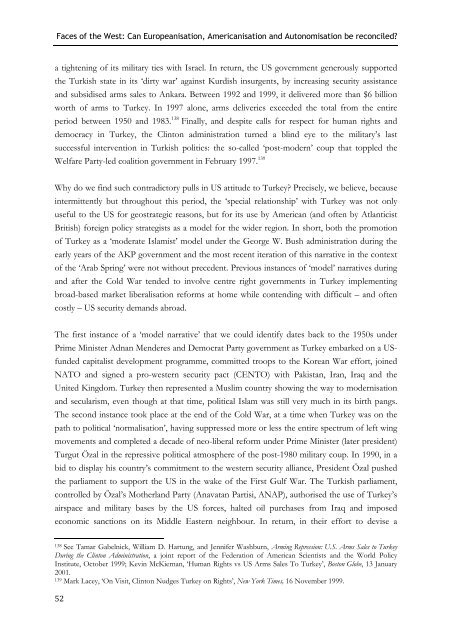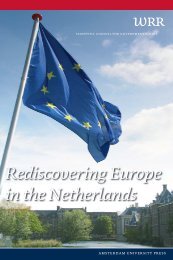The Western Condition - St Antony's College - University of Oxford
The Western Condition - St Antony's College - University of Oxford
The Western Condition - St Antony's College - University of Oxford
You also want an ePaper? Increase the reach of your titles
YUMPU automatically turns print PDFs into web optimized ePapers that Google loves.
Faces <strong>of</strong> the West: Can Europeanisation, Americanisation and Autonomisation be reconciled?<br />
a tightening <strong>of</strong> its military ties with Israel. In return, the US government generously supported<br />
the Turkish state in its ‘dirty war’ against Kurdish insurgents, by increasing security assistance<br />
and subsidised arms sales to Ankara. Between 1992 and 1999, it delivered more than $6 billion<br />
worth <strong>of</strong> arms to Turkey. In 1997 alone, arms deliveries exceeded the total from the entire<br />
period between 1950 and 1983. 138 Finally, and despite calls for respect for human rights and<br />
democracy in Turkey, the Clinton administration turned a blind eye to the military’s last<br />
successful intervention in Turkish politics: the so-called ‘post-modern’ coup that toppled the<br />
Welfare Party-led coalition government in February 1997. 139<br />
Why do we find such contradictory pulls in US attitude to Turkey? Precisely, we believe, because<br />
intermittently but throughout this period, the ‘special relationship’ with Turkey was not only<br />
useful to the US for geostrategic reasons, but for its use by American (and <strong>of</strong>ten by Atlanticist<br />
British) foreign policy strategists as a model for the wider region. In short, both the promotion<br />
<strong>of</strong> Turkey as a ‘moderate Islamist’ model under the George W. Bush administration during the<br />
early years <strong>of</strong> the AKP government and the most recent iteration <strong>of</strong> this narrative in the context<br />
<strong>of</strong> the ‘Arab Spring’ were not without precedent. Previous instances <strong>of</strong> ‘model’ narratives during<br />
and after the Cold War tended to involve centre right governments in Turkey implementing<br />
broad-based market liberalisation reforms at home while contending with difficult – and <strong>of</strong>ten<br />
costly – US security demands abroad.<br />
<strong>The</strong> first instance <strong>of</strong> a ‘model narrative’ that we could identify dates back to the 1950s under<br />
Prime Minister Adnan Menderes and Democrat Party government as Turkey embarked on a USfunded<br />
capitalist development programme, committed troops to the Korean War effort, joined<br />
NATO and signed a pro-western security pact (CENTO) with Pakistan, Iran, Iraq and the<br />
United Kingdom. Turkey then represented a Muslim country showing the way to modernisation<br />
and secularism, even though at that time, political Islam was still very much in its birth pangs.<br />
<strong>The</strong> second instance took place at the end <strong>of</strong> the Cold War, at a time when Turkey was on the<br />
path to political ‘normalisation’, having suppressed more or less the entire spectrum <strong>of</strong> left wing<br />
movements and completed a decade <strong>of</strong> neo-liberal reform under Prime Minister (later president)<br />
Turgut Özal in the repressive political atmosphere <strong>of</strong> the post-1980 military coup. In 1990, in a<br />
bid to display his country’s commitment to the western security alliance, President Özal pushed<br />
the parliament to support the US in the wake <strong>of</strong> the First Gulf War. <strong>The</strong> Turkish parliament,<br />
controlled by Özal’s Motherland Party (Anavatan Partisi, ANAP), authorised the use <strong>of</strong> Turkey’s<br />
airspace and military bases by the US forces, halted oil purchases from Iraq and imposed<br />
economic sanctions on its Middle Eastern neighbour. In return, in their effort to devise a<br />
138 See Tamar Gabelnick, William D. Hartung, and Jennifer Washburn, Arming Repression: U.S. Arms Sales to Turkey<br />
During the Clinton Administration, a joint report <strong>of</strong> the Federation <strong>of</strong> American Scientists and the World Policy<br />
Institute, October 1999; Kevin McKiernan, ‘Human Rights vs US Arms Sales To Turkey’, Boston Globe, 13 January<br />
2001.<br />
139 Mark Lacey, ‘On Visit, Clinton Nudges Turkey on Rights’, New York Times, 16 November 1999.<br />
52

















